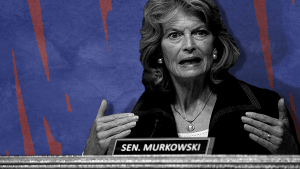It's time for Lisa Murkowski to join the Democrats
- Oops!Something went wrong.Please try again later.
- Oops!Something went wrong.Please try again later.
- Oops!Something went wrong.Please try again later.
- Oops!Something went wrong.Please try again later.

For Sen. Lisa Murkowski, it must seem like deja vu all over again.
On Saturday, the leaders of the Alaska GOP decided to turn their backs on Murkowski, the moderate Republican incumbent whose seat is up for election in 2022. Egged on by former President Donald Trump, they endorsed a conservative challenger, Kelly Tshibaka, by a 58-17 margin. This was no surprise: Murkowski has increasingly been on the outs with her state party after she voted to convict Trump at his impeachment trial following the Jan. 6 insurrection.
"Murkowski has got to go!" Trump said last month, endorsing Tshibaka.
If the story seems familiar, it should. Murkowski has held her seat since 2002, when she was appointed by her father, then-Gov. Frank Murkowski. But in 2010, she shockingly lost the state's Republican primary to Joe Miller, a Tea Party candidate who had been endorsed by former Gov. Sarah Palin — the proto-Trumpist politician still at the brief height of her fame and influence. Then, as now, Murkowski was seen as not quite conservative enough for her conservative party. "She's definitely seen as way too left of the right, if you will," one observer told The New York Times. But Murkowski had a surprise of her own: She launched an independent write-in campaign and successfully, but narrowly, retained her seat with the backing of a plurality of Alaskans who thought "too left of the right" was just right.
Over the weekend, Murkowski sounded ready to run it back, 2010-style. "Alaskan voters will decide who represents them in D.C.," she said in a statement, "and I work every day to earn their support."
Things have changed since 2010, though. For one thing, Alaska has adopted a new voting scheme for the 2022 election — instead of party primaries, the top four finishers in an all-comers primary will advance to the general election, where the winner will be chosen by ranked-choice voting of the sort that proved so complicated in the recent New York mayoral primary. That means Murkowski doesn't have to worry so much about whether or not the Republican Party formally backs her, but it also means the political landscape might be less predictable than in the past.
It's also the case that Sarah Palin was no Donald Trump. Palin had a hit-or-miss moment as a kingmaker, but Trump and those who pay fealty to him now dominate the GOP to an extraordinary extent. That raises two questions: How long can Murkowski defy the ever-less-moderate trends in the Republican Party? And after being rejected twice in 12 years by Alaska Republicans, why would she even want to?
Indeed, this seems like an excellent moment for Murkowski to declare her independence and start to caucus with Democrats in the Senate.
She has clearly contemplated the possibility. "I will tell you, if the Republican Party has become nothing more than the party of Trump, I sincerely question whether this is the party for me," she said in January, after the insurrection. Trump had caused enough damage: "I want him out" of the party, she said.
When she made that statement, in the early days following the attacks on the Capitol, it still seemed like there might be a battle for the GOP's soul. Senate GOP leader Mitch McConnell (R-Ky.) let it be known he might support Trump's impeachment. Sen. Lindsey Graham (R-S.C.) said to "count me out" of Trump's excesses. House Minority Leader Kevin McCarthy (R-Calif.) said Trump "bears responsibility" for the riot. There was reason to believe, after four long years, that the Republican Party might no longer be the party of Trump.
All three men backtracked from those early signs of independence, of course, and the GOP now is more committed than ever to Trump's false claims that he won the 2020 election — and to ensuring Republicans can't lose the next presidential election. It's Trump's party. The question now is what Murkowski is going to do about it.
After spending her entire political career as a Republican, Murkowski might hesitate to jump ship. But right now, the central question of American politics — the one on which everything else depends — is the future of our democracy: Are you for it or against it? The GOP has taken the side of the insurrectionists. Murkowski hasn't. It seems like an easy call.
Murkowski's plight resembles that of the late Sen. Arlen Specter, the Pennsylvanian who served as a Republican for most of his 30 years in the U.S. Senate — but who flipped to the Democratic Party in 2009 when it became clear he was no longer conservative enough to win another GOP primary. "I know I'm disappointing many of my colleagues," Specter said at the time. "The disappointment runs in both directions." Murkowski probably feels the same way these days. The switch didn't work for Specter, though: He lost the Democratic primary the next year and left office — too left for the right, and too right for the left.
Before Specter, the most famous party switcher in American politics might have been Ronald Reagan, who was a Democrat — and a union leader — for years before he switched to the GOP and launched his political career. "I didn't leave the Democratic Party," he said. "The party left me." It is clear the Republican Party has left Lisa Murkowski. She might as well make it official.
You may also like
Fox News host Tucker Carlson seems scandalized reporters are investigating his NSA spying claims
Fox is launching a weather streaming service, and it's already feuding with The Weather Channel
Britain is going to try to 'live with' COVID. The rest of the world is watching.
